ReVision: Exhibiting Artist Conversation
December 1, 2021 5:00 pm - 6:30 pm Virtual, on Zoom
ReVisioning History, Identity & Home
Annu Palakunnathu Matthew’s ReVision exhibition explores hidden histories, untold stories, and traumatic events through photography, video, installation and sculpture. Spanning two decades, the works on view include her early photographic series Memories of India, her thought-provoking self-portraits based on Edward S. Curtis’ photographs of the Indigenous peoples of what is now the Northwest United States, and a selection of recent works on the support Indian soldiers provided on behalf of the British during WWII, followed by the harrowing post-war Partition of India in 1947. These series make visible histories that have been at worst, erased, and at best, unrecognized. They include the dehumanizing legacies of colonialism wrought by the United States and Britain, stories of migration and immigration, and the traumatic division of India into India and Pakistan that continues to be an open wound today.
For a deeper look into each of these complex content areas, Annu Palakunnathu Matthew will be joined in conversation by Senior Curator Dr. Francine Weiss, Dr. Diya Gupta, Fellow of Race, Ethnicity and Equality in History at the Royal Historical Society and the Institute of Historical Research, UK, Mr. Hiro Hiranandani, a survivor of The Partition of British India, and Lorén Spears, Executive Director of Tomaquag Museum. Ana González, podcast producer and host, will moderate the discussion.
This panel discussion will be held virtually on Zoom.
FREE, but registration is required to receive the Zoom link.
About Our Guests:
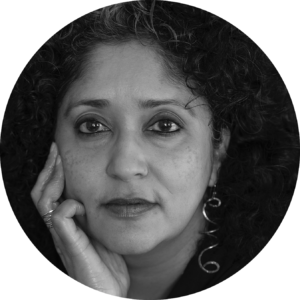 Annu Palakunnathu Matthew is a passionate mentor to students and emerging artists, and a Professor of Art at the University of Rhode Island where she also served as the Director of the Center for the Humanities and the Silvia-Chandley Professor of Nonviolence and Peace Studies. She has exhibited in solo shows at the Royal Ontario Museum, Canada; Nuit Blanche (Toronto); and sepiaEYE, NYC. Selected group exhibitions include: the RISD Museum; Museum of Fine Arts, Boston; San Jose Museum of Art; Museum of Fine Arts, Houston; Victoria & Albert Museum; 2018 Kochi-Muziris Biennale; 2009 Guangzhou Photo Biennial; and Smithsonian Institution. Matthew has received many grants and fellowships including two Fulbright Fellowships, a MacColl Johnson Fellowship, and grants from the Rhode Island State Council of the Arts. She was also an artist in residence at Yaddo and the MacDowell Colony. Matthew is represented by sepiaEYE, New York City.
Annu Palakunnathu Matthew is a passionate mentor to students and emerging artists, and a Professor of Art at the University of Rhode Island where she also served as the Director of the Center for the Humanities and the Silvia-Chandley Professor of Nonviolence and Peace Studies. She has exhibited in solo shows at the Royal Ontario Museum, Canada; Nuit Blanche (Toronto); and sepiaEYE, NYC. Selected group exhibitions include: the RISD Museum; Museum of Fine Arts, Boston; San Jose Museum of Art; Museum of Fine Arts, Houston; Victoria & Albert Museum; 2018 Kochi-Muziris Biennale; 2009 Guangzhou Photo Biennial; and Smithsonian Institution. Matthew has received many grants and fellowships including two Fulbright Fellowships, a MacColl Johnson Fellowship, and grants from the Rhode Island State Council of the Arts. She was also an artist in residence at Yaddo and the MacDowell Colony. Matthew is represented by sepiaEYE, New York City.
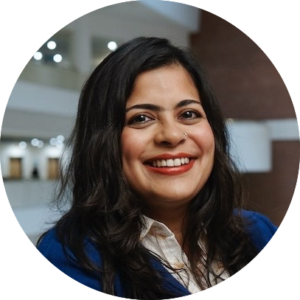 Dr. Diya Gupta is Past & Present Fellow: Race, Ethnicity and Equality in History at the Royal Historical Society and the Institute of Historical Research, UK. She is a literary and cultural historian interested in the intersections between life-writing, visual and material culture, and literature, particularly in response to war. Her first book, under contract with Hurst and Oxford University Press, is on an emotional history of India in the Second World War. She was an academic consultant on ‘Provisional Semantics’, a project led by the Imperial War Museums on colonial photographs during the Second World War and India.
Dr. Diya Gupta is Past & Present Fellow: Race, Ethnicity and Equality in History at the Royal Historical Society and the Institute of Historical Research, UK. She is a literary and cultural historian interested in the intersections between life-writing, visual and material culture, and literature, particularly in response to war. Her first book, under contract with Hurst and Oxford University Press, is on an emotional history of India in the Second World War. She was an academic consultant on ‘Provisional Semantics’, a project led by the Imperial War Museums on colonial photographs during the Second World War and India.
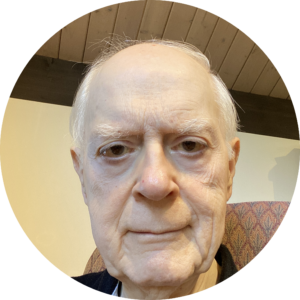 Mr. Hiro Hiranandani was born in 1938 in province of Sindh, British India. In August of 1947, the country was partitioned by the British into Independent India & Pakistan, and the Sindh province became part of Pakistan. Being Hindu, he and his family were forced to flee across the border to Jodhpur, India for safety, where they became refugees. Hiranandani attended a special school set up for the Sindhi refugees, and earned a degree at University in Bombay. In 1956, he emigrated to the United States to further his education in engineering, earning his BSEE from the University of Missouri and MSEE from Purdue. He is now retired, but continues some work as a business consultant.
Mr. Hiro Hiranandani was born in 1938 in province of Sindh, British India. In August of 1947, the country was partitioned by the British into Independent India & Pakistan, and the Sindh province became part of Pakistan. Being Hindu, he and his family were forced to flee across the border to Jodhpur, India for safety, where they became refugees. Hiranandani attended a special school set up for the Sindhi refugees, and earned a degree at University in Bombay. In 1956, he emigrated to the United States to further his education in engineering, earning his BSEE from the University of Missouri and MSEE from Purdue. He is now retired, but continues some work as a business consultant.
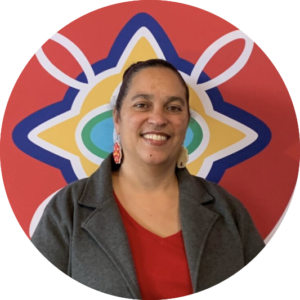 Lorén M. Spears is the Executive Director of Tomaquag Museum. Lorén aspires to empower Native youth and to educate the public on Native history, culture, environment and the arts. Lorén shares her cultural knowledge and traditional arts learned through her family with the public through the museum programs such as tours, virtual programming, and educational resources. Under Lorén’s leadership, Tomaquag Museum received the Institute of Museum and Library Services’ National Medal. An educator for 25 years, she has served as an adjunct faculty at Brown University and University of Rhode Island. Lorén founded the Nuweetooun School affiliated with the Tomaquag Museum and was a teacher in Newport public schools for 12 years. Outside of her work in the museum, she is also an educator, activist, author, and Indigenous artist. Her work as an author includes Dawnland Voices, An Anthology of Indigenous Writing of New England; Through Our Eyes: An Indigenous View of Mashapaug Pond; The Pursuit of Happiness: An Indigenous View, From Slaves to Soldiers: The 1st Rhode Island Regiment in the American Revolution and she co-edited The Key into the Language of America by Roger Williams. Lorén received her undergraduate degree from the University of Rhode Island and her Master’s degree from the University of New England with a focus on elementary education. Lorén has been the recipient of numerous awards and honors most notably 2016 Tom Roberts Prize for Creative Achievement in the Humanities, a Doctor of Humane Letters, honoris causa, from the University of Rhode Island in 2017.
Lorén M. Spears is the Executive Director of Tomaquag Museum. Lorén aspires to empower Native youth and to educate the public on Native history, culture, environment and the arts. Lorén shares her cultural knowledge and traditional arts learned through her family with the public through the museum programs such as tours, virtual programming, and educational resources. Under Lorén’s leadership, Tomaquag Museum received the Institute of Museum and Library Services’ National Medal. An educator for 25 years, she has served as an adjunct faculty at Brown University and University of Rhode Island. Lorén founded the Nuweetooun School affiliated with the Tomaquag Museum and was a teacher in Newport public schools for 12 years. Outside of her work in the museum, she is also an educator, activist, author, and Indigenous artist. Her work as an author includes Dawnland Voices, An Anthology of Indigenous Writing of New England; Through Our Eyes: An Indigenous View of Mashapaug Pond; The Pursuit of Happiness: An Indigenous View, From Slaves to Soldiers: The 1st Rhode Island Regiment in the American Revolution and she co-edited The Key into the Language of America by Roger Williams. Lorén received her undergraduate degree from the University of Rhode Island and her Master’s degree from the University of New England with a focus on elementary education. Lorén has been the recipient of numerous awards and honors most notably 2016 Tom Roberts Prize for Creative Achievement in the Humanities, a Doctor of Humane Letters, honoris causa, from the University of Rhode Island in 2017.
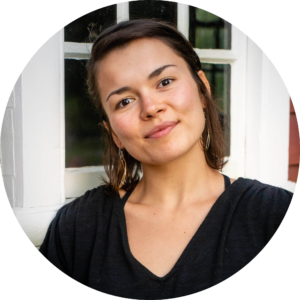 Ana González is a podcast producer and host living in Rhode Island. She was the founding producer of Mosaic, The Public’s Radio’s award-winning podcast on immigrant experiences. Before working in public radio, Ana worked in documentary and commercial film. She and her partner, Jeff Matteis, ran Earf Studios, a small production company. In 2017, they released Almost Dope, their first feature-length documentary about Rhode Island’s hip hop history. Ana is a graduate of Brown University, where she concentrated in Jazz Studies and played bass in a mix of jazz, hip hop, and R&B groups.
Ana González is a podcast producer and host living in Rhode Island. She was the founding producer of Mosaic, The Public’s Radio’s award-winning podcast on immigrant experiences. Before working in public radio, Ana worked in documentary and commercial film. She and her partner, Jeff Matteis, ran Earf Studios, a small production company. In 2017, they released Almost Dope, their first feature-length documentary about Rhode Island’s hip hop history. Ana is a graduate of Brown University, where she concentrated in Jazz Studies and played bass in a mix of jazz, hip hop, and R&B groups.
Ana’s goal with her current work in audio storytelling is to amplify voices and stories that mainstream media overlooks and to do so with the utmost empathy, nuance, and willingness to learn. Her main objective is to create sustainable communities around storytelling and empower people to speak their truths to power.